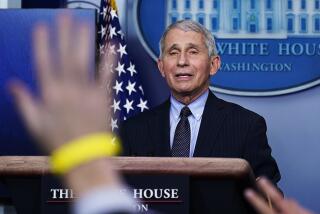Column: Trump’s inexcusable coronavirus failures may stem from an inexcusable source
- Share via
On Jan. 20, South Korea and the United States both reported their first confirmed cases of the novel coronavirus.
While President Moon Jae-in of South Korea acted with ingenuity, dispatch and courage, President Trump delayed, denied and lied.
As of Wednesday night, South Korea reported 169 total deaths, and the numbers seem to be leveling off.
You know where this goes.
As of Wednesday night, the U.S. reported more than 5,000 deaths, with a potentially terrifying surge in fatalities still to come.
And thus we get Trump’s latest wretched failure to lead. But this time he seems to have been animated by more than his addled psyche. A work of sophistry by the libertarian legal professor Richard A. Epstein, which was widely circulated by Trumpites, helped to justify the administration’s equivocation and denial.
The federal government’s response to the virus, in other words, has been driven by the usual Trumpworld up-is-down madness. Only this time it comes with a luxe academic sheen.
According to the Washington Post, Trumpites began sharing “Coronavirus Perspective,” Epstein’s first blog post on the matter, just over two weeks ago, when it appeared on the website of the conservative Hoover Institution, where Epstein is a senior fellow.
Epstein’s first post — along with two others, “Coronavirus Overreaction” and “The Grim Cost of Lockdowns”— evidently told Trumpites what they wanted to hear: That the virus had been overhyped by liberals trying to crush personal freedoms. “Progressives think they can run everyone’s lives through central planning,” he groused in the second post, with all the brio of a new reader of “Atlas Shrugged.”
He also claimed it would kill only the weak and elderly people the economy could afford to lose. And that the flu-like bug would soon lose steam.
But Epstein also got truly rash, projecting that in the U.S. the coronavirus would cause only 500 deaths. With little explanation, and just as reality was proving him wrong, he revised his tally to 5,000.
Wrong again. Dr. Anthony Fauci, director of the National Institute of Allergy and Infectious Diseases, projects the total at 100,000 and 240,000, if we’re lucky.
Epstein described that first faulty calculation as “a public-relations gaffe.”
A lot of Epstein’s factual assertions were challenged by journalist Isaac Chotiner, citing various virus and infectious disease experts, in a Q and A in the New Yorker, and also by the data scientist Rex Douglass, whose methodical dismantling of Epstein’s arguments went online Monday.
Douglass, of the Center for Peace and Security Studies at UC San Diego, faults Epstein not just for errors but for intellectual dishonesty: cherry-picking data, avoiding specificity, using doublespeak, and showing indifference to the truth.
And yet Trump’s recent helter-skelter propaganda has regularly contained echoes of Epstein’s bad faith. When Trump condemned a disciplined stay-at-home response to the virus as “overreaction,” and wanted Americans to get back to business as usual by April 12 — those moves could have been derived straight from Epstein’s work.
I hope Epstein’s posts go down in history in much the same way as another landmark of pseudoscience: The 1998 paper in the august medical journal Lancet by Andrew Wakefield. This is the article that falsely connected vaccinations with developmental disorders in children.
Wakefield’s paper, since retracted by the Lancet, gave ballast to the dangerous anti-vaccination movement, which contributed to a resurgence of measles; Epstein’s work seems to have informed at least some of the Trump’s administration’s fateful coronavirus missteps, adding to the pandemic’s dangers and increasing the toll of sickness and death.
And yet Epstein calls an inexcusable mistake a public-relations gaffe.
And there’s the crux. Why did a legal scholar at a solemn think tank dish out something he would later excuse as PR? What about the accuracy, honesty and the consequences of his claims?
Maybe it’s a consequence of the internet bandstand, the notion that everyone has a right to take the mic on any subject and win an audience. Maybe Epstein found the possibility of socking it to pearl-clutching lib over-reactors impossible to resist. After all, when you say dangerous Trumpite stuff like “back to work by Easter!” you get to make people mad; you get to run with the devil. Maybe it feels manly.
Like many conservative intellectuals, Epstein likes to think of himself as a “contrarian,” an ivory-tower troll. Douglass convincingly identifies the kernel of Epstein’s intellectual misconduct in that pose.
“Contrarianism is not a search for truth, it’s a search for political influence,” Douglass writes. “Performative controversy, fake horse races, hypotheses that don’t follow from theory are immediate red flags the author doesn’t actually care what the right answer is.”
Indeed. The Hoover Institution should retract Epstein’s dangerous posts, which constitute disinformation. They are a public-health hazard. Trollish posturing has no place in serious intellectual work, let alone in the formation of White House policy.
More to Read
A cure for the common opinion
Get thought-provoking perspectives with our weekly newsletter.
You may occasionally receive promotional content from the Los Angeles Times.










